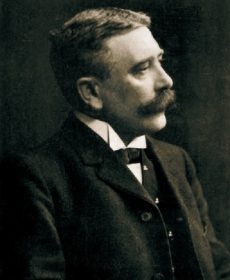Swiss linguist Ferdinand de Saussure was the founder of structural linguistics, which broke with philological and historical approaches to language to establish a new approach to language based on the understanding that “language is a form, not an essence.” In defining language as a system of signs, he also became the father of modern semiotics. His notion that the meaning of a sign is to be found in its relation to other signs laid the foundation for the structuralist school in linguistics, semiotics, and social theory.
Born November 26, 1857, in Geneva, Switzerland, Saussure could read and write five languages by the time he was 15 years old. He attended the University of Geneva and the University of Berlin before receiving his PhD at the University of Leipzig in 1880. In 1879, while still a student, he made his reputation with a brilliant contribution to historical linguistics, Memoir on the Original System of Vowels in the Indo-European Languages, which theorized about how vowel alternations take place in Indo-European languages.
Saussure proceeded to teach in Paris at the École Pratique des Hautes Etudes. He then returned to Geneva and became a professor of Indo-European linguistics and Sanskrit and general linguistics at the University of Geneva from 1891 to 1912. He wrote no other books but was enormously influential as a teacher. He is best known for the Course in General Linguistics, a book constructed from notes of his lectures taken by students.
The Course is brimming with ideas. Saussure broke with the dominant comparative-historical school of his day by pointing out that the historical origins of language are irrelevant to the ways people actually use language to communicate. The fact that “beef” is an Anglicization of a Middle French word that entered into English after the Norman conquest is completely unnecessary for understanding its use in contemporary speech. Saussure argued that in addition to diachronic studies of language evolution, there was a need for a synchronic linguistics that would describe languages as they work in contemporary life.
 Perhaps his most influential contribution to linguistic and social theory was his distinction between language (langue) and speech (parole). Language, for Saussure, is the signifying system through which we communicate. Speech refers to actual utterances. Because we can communicate an infinite number of utterances, it is the system behind them that is important. Saussure illustrated this with reference to a chess game. The chess game has its rules and its pieces and its board. These define the game. Actual games of chess are only interesting to the participants. Thus while linguists may collect data from actual instances of speech, the goal is to work back to the system of rules and words that organizes speech.
Perhaps his most influential contribution to linguistic and social theory was his distinction between language (langue) and speech (parole). Language, for Saussure, is the signifying system through which we communicate. Speech refers to actual utterances. Because we can communicate an infinite number of utterances, it is the system behind them that is important. Saussure illustrated this with reference to a chess game. The chess game has its rules and its pieces and its board. These define the game. Actual games of chess are only interesting to the participants. Thus while linguists may collect data from actual instances of speech, the goal is to work back to the system of rules and words that organizes speech.
Only slightly less important was his notion of the arbitrary meaning of the sign. Any word, Saussure said, is a sound that stands for an idea. The word tree does not refer to the thing in the world but rather to a concept we have in our heads. The same concept can be represented by many different words in different languages because the relationship between any given sound and the idea it signifies is arbitrary—it is created by society.
Although both Saussure’s langue/parole distinction, and his insistence on the arbitrariness of the sign have been criticized, his influence has been remarkable. The structuralist movement in anthropology, cultural studies, linguistics and literary theory, and social theory derive from his work, as do, in a less direct way, the influential deconstructionist and poststructuralist work of Roland Barthes, Jacques Derrida, Michel Foucault, Julia Kristeva, and Jacques Lacan.
References:
- Culler, J. (1985). Saussure. Ithaca, NY: Cornell University Press.
- Harris, R. (1987). Reading Saussure: A critical commentary on the “cours de linguistique générale.” London: Duckworth.
- de Saussure, F. (1974). Course in general linguistics (Wade Baskin, Trans.). London: Fontana/ Collins.

